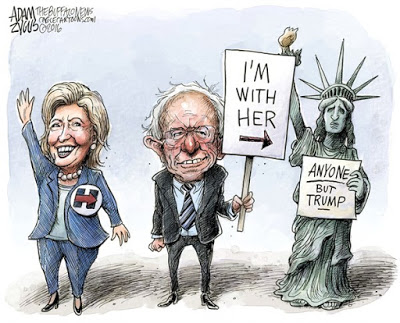So, besides the nativist, xenophobic, and racist appeals to the darker side of American society, Trump speech was all about trade, and its effects on the working class. That is clearly the strategy for November, and Hillary is, for obvious reasons, weak on that subject. I don't think Trump even thinks Bernie supporters would vote for him, but his appeal to them last night was for them not to vote for Hillary.Trade matters, even if Trump has no clue why. As, I have explained several times (go here, here or here for the basics of the theory, here for a brief discussion of the loss of political support for Free Trade Agreements, FTAs) free trade is a bit of a misnomer. Nobody is for purely free trade or complete protectionism. The real discussion is about managed trade, and for what purposes one should manage it. While most economists agree that trade should be managed for phytosanitary rules and defenses purposes, there is unwillingness to accept that the quality of employment and real wages matter too. Trade matters, because what one country produces matters. Complex products with higher value added are more likely to lead to the incremental innovations that are behind the wealth of nations. Trade agreements that ossify the production structure in sectors with low levels of technological dynamism lead to lower growth, and employment.
Topics:
Matias Vernengo considers the following as important: Free Trade, FTA
This could be interesting, too:
Joel Eissenberg writes The death of free trade?
Angry Bear writes Why the Democrats’ love affair with ‘free trade deals’ is over
Mike Norman writes The Cheapest Way For Trump To Save U.S. Oil — Lourcey Sams
Mike Norman writes Lars P. Syll — Paul Krugman — finally — admits he was wrong!
Trade matters, even if Trump has no clue why. As, I have explained several times (go here, here or here for the basics of the theory, here for a brief discussion of the loss of political support for Free Trade Agreements, FTAs) free trade is a bit of a misnomer. Nobody is for purely free trade or complete protectionism. The real discussion is about managed trade, and for what purposes one should manage it. While most economists agree that trade should be managed for phytosanitary rules and defenses purposes, there is unwillingness to accept that the quality of employment and real wages matter too.

